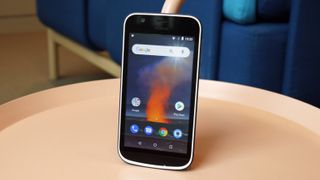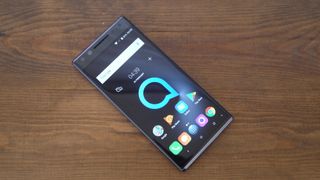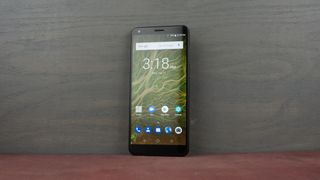The best phones at MWC 2018
Another year, another MWC, and this one didn’t disappoint as loads of new phones were announced, from flagships like the Samsung Galaxy S9 and Sony Xperia XZ2, to super-affordable options like the Nokia 1.
In short, there’s something for almost everyone so picking our top phones from the show was hard, but somehow we’ve managed to create this list of the best phones at MWC 2018.
Presented in no particular order, here’s a selection of handsets that could easily be candidates for your next pocket buddy (along with one concept phone that we really wish we could buy).
Samsung Galaxy S9
The Samsung Galaxy S9 is likely to be the most popular handset from MWC 2018, the latest entry in a range of phones that arguably only has the iPhone for competition.
And while this year’s model seems like a fairly small upgrade over the Samsung Galaxy S8 it’s still worthy of attention, thanks to a dual-aperture camera complete with the world’s first f/1.5 aperture on a phone.
That should lead to impressive low light shots, and while Samsung has clearly devoted much of its attention to camera upgrades there are lots of other things to like here, such as the S9’s 5.8-inch QHD+ display, stereo speakers, stylish design and top-tier chipset. All of which comes at a cost of $719.99 / £739 / AU$1,199.
Samsung Galaxy S9 Plus
Although we’re not ranking these phones in general, the Samsung Galaxy S9 Plusis the clear winner, as its TechRadar MWC 2018 best in show award attests.
It’s like the Samsung Galaxy S9 but with more of almost everything – more screen at 6.2 inches, more cameras as there’s a dual-lens one on the back, more RAM at 6GB, a bigger battery at 3,500mAh and more storage, with 128GB built-in.
Everything else is much the same as the regular-sized S9 and that’s no bad thing, as it means you get a crystal-clear 1440 x 2960 Super AMOLED display, a top-end chipset, a clever variable aperture camera, stereo speakers and a sleek and curvy metal and glass design.
At $839.99 / £869 / AU$1,349 it’s not cheap, but we might not see many – if any –
better phones this year.
Sony Xperia XZ2
Aside from the new look, the Sony Xperia XZ2 also has a 5.7-inch 1080 x 2160 display with a trendy 18:9 aspect ratio, a 19MP camera that has the honor of being the first smartphone snapper capable of shooting 4K HDR video, a high-end Snapdragon 845 chipset and a 3,180mAh battery that supports wireless charging.
There’s also a new Dynamic Vibration System, which can add vibrations to games, movies and music and is paired with a decent set of stereo speakers.
It’s going to cost a pretty hefty £699 (around $950 / AU$1350) and in Europe at least you should be able to buy it from early April (the US release date is still to be confirmed).
Sony Xperia XZ2 Compact
Phone screens are generally getting bigger, but if you prefer something smaller Sony has you covered there, with the Sony Xperia XZ2 Compact.
This phone is a lot like the standard Sony Xperia XZ2, but with a smaller 5.0-inch (though just as high resolution) 1080 x 2160 screen. It also has the same powerful Snapdragon 845 chipset, the same 19MP camera and the same stereo speakers.
Really the only differences other than the screen size are the build – with the XZ2 Compact trading glass for plastic on the back, the battery, with the XZ2 Compact sporting a smaller 2,870mAh unit, and the Dynamic Vibration System, which the XZ2 Compact lacks (as well as wireless charging).
But in most ways that matter this looks to be a real compact flagship, and it’ll cost £549 (around $750 / AU$970).
Asus Zenfone 5 (2018) / Asus Zenfone 5Z
The Asus Zenfone 5 (2018) and Zenfone 5Z were among the more surprising phones at MWC 2018, as Asus isn’t typically known for high-end phones; yet these phones combine a great design with strong specs and potentially appealing prices.
You can’t escape the fact that the Zenfone 5 looks a lot like an iPhone X, thanks to its bezel-free screen with a notch at the top, but that coupled with a shimmery glass back ensures it’s a good-looking device.
Specs include a 6.2-inch Full HD+ display, dual-lens cameras, stereo speakers, a 3,300mAh battery, a mid-range Snapdragon 636 chipset and 4GB of RAM.
The Zenfone 5Z meanwhile has the same specs but swaps the chipset for a high-end Snapdragon 845 one and increases the RAM to up to 8GB, as well as packing in more storage, with a maximum of 256GB.
Prices for the Zenfone 5 haven’t been confirmed, but the Zenfone 5Z is set to start at £500 (around $700/AU$885), which is a low price for a flagship and the standard Zenfone 5 will presumably cost less.
Nokia 8 Sirocco
Nokia’s new flagship isn’t the Nokia 9 – instead we got the Nokia 8 Sirocco – but despite having the same number in its name as the Nokia 8 it looks to be a significant upgrade.
It has an almost all-glass body with dust and water resistance, and a 5.5-inch 1440 x 2560 curved OLED screen.
There’s also a pair of Zeiss-tuned cameras on the back – a 12MP wide-angle lens and a 13MP telephoto one.
Other specs include a 3,260mAh battery and 6GB of RAM, with the only slight disappointments being 2017’s Snapdragon 835 chipset (rather than the new 845) and the lack of a headphone jack.
If those aren’t deal-breakers for you the Nokia 8 Sirocco will set you back AU$1,199 (around £660, $900) when it launches in April.
Vivo Apex Concept
The one phone on this list you won’t be able to buy is the Apex Concept, because, as the name suggests, this is just a concept handset for now – though one that we were able to try out for real at MWC.
The highlight of the phone is its fingerprint scanner, which is built into the screen, and not just a small section of the screen. Rather, it takes up a large portion of the bottom section, so you can hit it with ease.
The scanner also lets you secure the phone – or elements of it – with two fingerprints instead of one, and the screen is almost completely bezel-free, with Vivo opting for a pop-up front-facing camera, rather than a notch, and embedding the earpiece and proximity sensor under the display.
LG V30S ThinQ
Just like the original V30 it has a 6.0-inch 1440 x 2880 OLED screen, a Snapdragon 835 chipset, a 3,300mAh battery and a dual-lens camera, pairing a 16MP lens with a 13MP one.
What’s changed is that the V30S ThinQ has more RAM at 6GB, more storage at up to 256GB, comes in a new Moroccan Blue shade and has a couple of new camera modes, including ‘AI CAM’, which allows the camera to automatically switch between eight different scenes as needed.
It’s not going to convince buyers of 2017’s model to upgrade, but if you’re using something older the LG V30S ThinQ could be worth considering.
Nokia 7 Plus
We got a whole host of new Nokia phones at MWC 2018, with the Nokia 7 Plusbeing an upper mid-range model that stands out through a 6.0-inch 1080 x 2160 display with fairly slim bezels.
Other highlights of the Nokia 7 Plus include the same dual-camera setup as the Nokia 8 Sirocco, meaning you get a 12MP wide-angle lens and a 13MP telephoto one. And the company claims you’ll get two days of life from the 7 Plus’s 3,800mAh battery.
The rest of the specs are a bit more mid-range, with the Nokia 7 Plus being powered by a Snapdragon 660 chipset and 4GB of RAM, but given that it’s priced at AU$749 (around £350, $490) that spec mix seems pretty reasonable.
The final spot? Asus Zenfone Max Plus M1 vs Nokia 1 vs Alcatel 5 vs ZTE Blade V9



MWC (Mobile World Congress) is the world’s largest exhibition for the mobile industry, stuffed full of the newest phones, tablets, wearables and more. TechRadar is reporting live from Barcelona all week to bring you the very latest from the show floor. Head to our dedicated MWC 2018 hub to see all the new releases, along with TechRadar’s world-class analysis and buying advice about your next phone.

